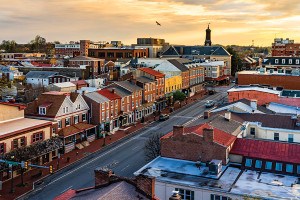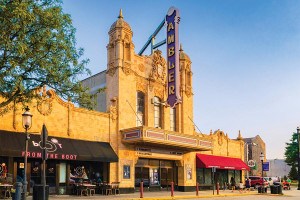Universal Defends Its Record at Charged Meeting About Royal Theater
After last night’s public meeting at the Bainbridge Club on the redevelopment of the Royal Theater, three things are certain:
1. Barring some miracle, the Royal will not survive whole.
2. Many residents would like owner Universal Companies to at least honor the theater’s history and heritage.
3. Universal will have to do more fence-mending to bring skeptical near neighbors on board with its plans.
The meeting was the first of what will likely be a series of public meetings to inform the community and obtain feedback on Universal’s plans to demolish and redevelop much of the African-American cultural landmark and build on an adjacent lot as a mixed-use project that will include street-level retail on South Street, apartments above, and new townhouses on Kater Street.
Jointly organized by the South of South Neighborhood Association (SOSNA) and the South Street West Business Association (SSWBA), the meeting attracted about 70 Graduate Hospital residents who were concerned about the Royal’s fate — or, in a few cases, who were interested in holding Universal’s feet to the fire.
Attendees heard Universal President and CEO Rahim Islam explain Universal’s activities and defend its track record as a developer, followed by a chronology of the Royal Theater’s past 38 years from Universal Executive Vice President and Chief Financial Officer Shahied Dawan.
The main message of the chronology was: Unlike previous owner Michael Singer, Universal has actively sought to honor its agreement with the Preservation Alliance of Greater Philadelphia to preserve the entire theater, one of the conditions Universal agreed to in a covenant attached to the Alliance’s sale of the building in 2000. But try as it might, it either could not make the numbers work or could not obtain the financing needed for plans to proceed.
Meanwhile, even though Universal put more than $1 million of its money into stabilizing the shell, the building continued to deteriorate.
Islam stressed that Universal finishes the jobs it starts. “We have never failed on a development we were charged with undertaking,” he told the audience at the meeting. He also noted that the company’s best-known project in the area, the redevelopment of the former Martin Luther King Plaza housing project in Hawthorne, played a key role in enabling the further transformation of the southern Avenue of the Arts and eastern Graduate Hospital.
He also noted founder Kenny Gamble’s commitment to the neighborhood where he was born and raised. “So many times, when African-Americans become successful, they leave the community. Kenny Gamble did the reverse,” he said.
Not all the residents who attended bought Universal’s arguments. Several near neighbors of other Universal projects in Graduate Hospital used the question-and-answer period following the presentation to vent their frustrations in getting Universal officials to respond to their complaints about construction adjacent to their properties. In one exchange, Islam said, “I can’t imagine anyone [at Universal] would not respond to your concerns. I can’t imagine Tamira Henson, our real estate specialist…”
“Yes, it was,” some audience members shouted, indicating it was Henson who had either ignored or dismissed their complaints.
Islam later pledged to take steps to fix any communication problems. “I’m not only the chief executive of Universal, I’m the chief critic of Universal as well,” he said. “If anyone has remotely done some of the things you say, I’m with you and I’ll work to correct it.”
Other residents questioned Universal’s willingness to consider legitimate offers to buy the building. One resident who did not give her name asked, “You bought the property for $400,000 and put $1 million into it. Why wouldn’t you sell to someone who offered $3.2 million to develop it with no public funds?”
Islam explained that the company actually had no intention of selling the building for the first 11 years it owned it: “The reason we even entertained that offer was because we had to prove hardship” in order to get permission from the Historical Commission to partly demolish the structure. Now, Universal says, “we will consider any legitimate offer.”
(Broker-developer Ori Feibush made an offer to purchase the Royal for an even larger sum earlier this year. That offer ended without a sale but led to a legal challenge in which neighbor Juan Levy is seeking to have Feibush named conservator of the Royal under a state law that allows historic buildings threatened with demolition by neglect to be placed in a form of receivership.)
The meeting also, perhaps unintentionally, brought to the surface lingering tensions between older and newer Graduate Hospital residents. South Street business owner Jennie Frisby told the meeting, “I’ve seen that theater [decay] for years under Michael Singer and nobody did anything about it.” Singer purchased the building in 1975; a petition he filed in 1991 seeking to demolish the theater sparked the effort to save it. Another unnamed resident who has lived in the area for years said, “I don’t believe there’s racial tension, but I don’t believe we’re together” on this project.
Several residents pleaded that Universal at least make an effort to preserve some of the structure’s integrity and historical legacy in any redevelopment. “I would love to see something that respected the history of the building” incorporated into the plans, said one resident, who suggested that instead of market-rate apartments, the project include artists’ loft space.
As with its previous efforts, Universal is seeking public funding to cover part of this development’s cost; a state grant awarded in 2011 for a previous proposal was withdrawn earlier this year when it became clear the project was not ready to proceed. But, said Dawan, “we are proceeding as though we will not get a public grant.”
The main obstacle to redeveloping the entire theater, Dawan said, was money. Both of Universal’s proposals to redevelop the property as an entertainment venue fell through because they were cost-prohibitive. Dawan estimated that restoring the theater for use as a performing arts space of any kind would cost $8 million in a conversation after the meeting. During the presentation, he noted that performing arts groups across the city are struggling with their budgets, another reason that returning the theater to its former status as a community cultural icon was unlikely to fly.
Under the timeline presented by Universal, the company will use some of the feedback it got at this meeting and at future private meetings with SOSNA, SSWBA and other stakeholders to refine its redevelopment proposal. Current plans call for the Royal’s facade — the only part of the building that must be preserved, according to Islam — to be maintained. Behind it would rise 7,000 square feet of retail space on South Street with 30 rental apartments above it. The Kater Street side of the development would contain 13 parking spaces and six townhouses. The project would also incorporate a vacant lot Universal owns next to the theater. The proposal would require approval from both the Philadelphia Historical Commission and the Zoning Board of Adjustment.


